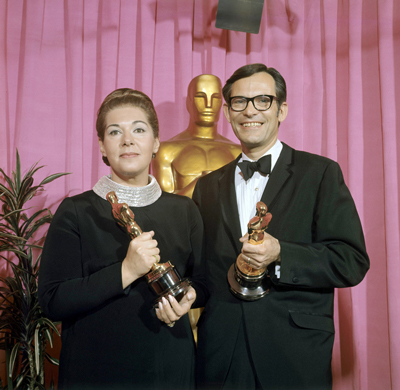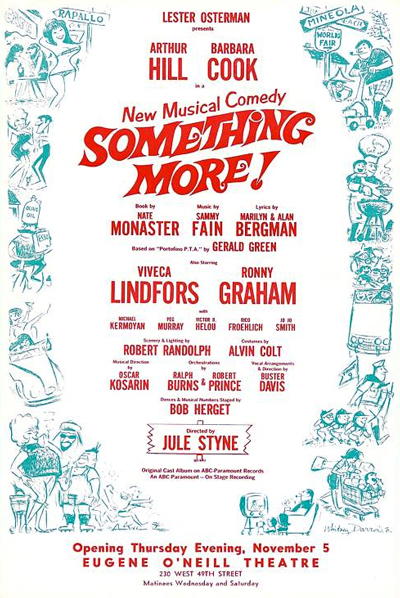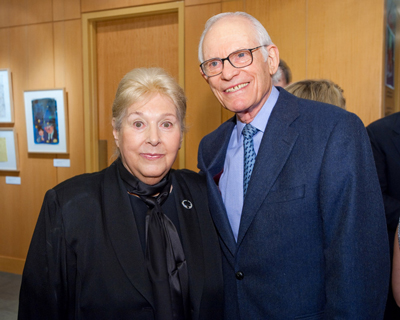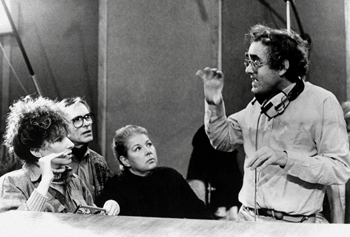Alan & Marilyn Bergman

Above: Marilyn and Alan winning their Oscars for their song “The Windmills of Your Mind” from The Thomas Crown Affair (1968)
May 2007Interview by Matt Howe / Barbra Archives
Alan and Marilyn Bergman were in Washington, D.C. to appear at The John F. Kennedy Center for the Performing Arts on May 15, 2007. “An Evening with Alan and Marilyn Bergman” unfolded like Bravo TV’s “Inside the Actors Studio”. Alan and Marilyn sat across from host Michael Kerker and answered questions about their long and distinguished career writing lyrics to film songs. The audience at The Kennedy Center was shown film clips from In the Heat of the Night and The Thomas Crown Affair, which illustrated how the Bergman’s songs were utilized for the opening and closing credits. Alan Bergman, accompanied by Andrew Ezrin on the piano, also sang several of the songs they’d written lyrics for (his album, “Lyrically, Alan Bergman” was released on May 8th). Lari White, a recording artist, wowed the audience when she performed a medley of songs from Yentl. (She had the Bergmans on their feet applauding, too.)
Going back in time, the married lyricists met while both were writing lyrics, separately, for songwriter Lew Spence. Marilyn Keith was Spence’s afternoon lyric writer and Alan Bergman was his morning lyric writer. Once Spence introduced them, the rest was history. Their first bona fide hit together was “Nice ‘n’ Easy” which was recorded by Frank Sinatra (who called them “the kids”).
Alan and Marilyn Bergman took some time during their visit to discuss their work with Barbra Streisand. It was hard for me not to gush. The Bergmans have written the lyrics to many of my favorite Streisand songs (see the accompanying song list). I was embarrassed that I kept repeating the word “beautiful” and “favorite” when talking about their songs.
[Related Link: Alan & Marilyn Bergman’s Musical Legacy with Barbra Streisand, which lists all of the Bergman's musical work—songs, albums, and liner notes—with Ms. Streisand.]
[The Bergmans finish each other’s sentences and have a great verbal rapport. I tried to capture that with the use of the ellipsis in this interview. This interview originally appeared in ALL ABOUT BARBRA magazine.]
Matt Howe: When did you first meet Barbra Streisand?
 Marilyn Bergman: 1962. We were writing a show in New York [Something More with Sammy Fain] and Jule Styne took us down to the Bon Soir to hear “a girl”. He said, “You have to hear this girl.” And we had been in casting sessions all day listening to girls. The last thing we wanted to do at the end of the day was go to hear another girl singer, but he said, “No, no, no, you must come.” So reluctantly we went. Little did we know… She walked out and sang one note and I remember starting to cry and I never stopped crying the whole show.
Marilyn Bergman: 1962. We were writing a show in New York [Something More with Sammy Fain] and Jule Styne took us down to the Bon Soir to hear “a girl”. He said, “You have to hear this girl.” And we had been in casting sessions all day listening to girls. The last thing we wanted to do at the end of the day was go to hear another girl singer, but he said, “No, no, no, you must come.” So reluctantly we went. Little did we know… She walked out and sang one note and I remember starting to cry and I never stopped crying the whole show.
Alan Bergman: I can remember exactly what she was wearing.
MH: What was she wearing?
MB: She was wearing a full-sleeved white blouse and a vest and a skirt made out of a menswear herringbone fabric. The hair was up. I think it’s the picture that’s on one of the first albums. I remember Peter Daniels was playing piano. And we went backstage afterwards to meet her …
AB: … in a dressing room that was like a telephone booth.
MB: She didn’t have a dressing room, but I think she shared with Phyllis Diller. [Barbra] came out. I remember saying to her, “Do you know how wonderful you are?” She didn’t answer me, but I looked at her and I knew, yes, she knew. She did know. She knew everything then, she knows everything now.
MH: Barbra didn’t record one of your songs until the What About Today? album in 1969 (“Ask Yourself Why”).
MB: I think that’s just the way it worked out. We’ve established from the beginning that we would never play her songs – and we don’t.
AB: She has to ask first.
MB: She either hears them, finds them, or asks us to write something. But we’ve never played her songs.
I hope that she forgets and leaves my door open
So I can have a little light from the hallway
If I can hear them talking, If I can hear them laughing
I know I won't be frightened, maybe
At night I know that's just my chair, the nice red one
But it looks different than it looks in the daytime
Sometimes I think it's moving, a big enormous monster
A dinosaur or dragon maybe
I close my eyes and there are ghosts and witches
I'm scared a wicked witch will eat me
Oh, how I wish it wasn't always dark at night...
“Mother and Child” [Child lyrics] Music by: Michel Legrand Lyrics by: Alan and Marilyn Bergman
MH: Can I ask you about Life Cycles of a Woman? In 1973, Barbra recorded “Between Yesterday and Tomorrow”, “Can You Tell the Moment”, and “Mother and Child”. The music was by Michel Legrand. The album has been discussed a lot by Barbra’s fans, how it was abandoned or not finished. Can you talk about it?
MB: I don’t know, we just never finished it. I think we all just got busy…
AB: … on other things.
MB: We never finished it.
AB: One of these days we will.
MH: Was “Wait” [from A Love Like Ours] part of that album?
AB: Yes. Absolutely. We worked on the ending [of “Wait” with Michel Legrand]. We changed the ending from the original years ago.
MH: During that same session it’s reported Barbra also sang “The Smile I’ve Never Smiled” and “Once You’ve Been in Love”. I’ve heard a bootleg of “Once You’ve Been in Love” and it’s just beautiful.
MB: There must be one around because when we did an evening that Stephen Holden moderated a few years ago in New York and he played it!
AB: [Barbra] gave it to him.
MB: Oh, she gave it to him. It’s an extraordinary record.
MH: Were “Once” and “Smile” part of the Life Cycles project?
MB: No they were from pictures …
AB: … themes from movies.
MB: “Once You’ve Been in Love” was from a picture called One is a Lonely Number. And “The Smile I’ve Never Smiled” is from Portnoy’s Complaint …
AB: … Both written by Michel Legrand. The extraordinary performance is on “Between Yesterday and Tomorrow”.
MH: “Between Yesterday and Tomorrow” is very existential.
AB: (Laughs)
MB: Yes, it’s an odd song. I like it.
 MH: I have to say that combining the two of you and Michel Legrand is the perfect marriage of words and music.
MH: I have to say that combining the two of you and Michel Legrand is the perfect marriage of words and music.
MB: Well, we love to work together.
MH: And then of course, when you add Streisand’s singing … I think her best work is with the three of you.
AB: Well the chemistry is just wonderful between the words and music and the voice. It’s really something special.
MB: We’re talking about over fifty songs … amazing. It’s amazing that Sony has never collected them all together.
MH: That would be great if Sony did a Streisand/Bergman songbook album and maybe even put some of the songs that haven’t been released on it! So, back to Life Cycles of a Woman – is that the title?
MB: No, I don’t think we ever gave it a name.
AB: I don’t think we did.
MB: It’s kind of an orphan.
MH: I think fans and biographers started calling it that, and it stuck.
AB: The intention of it was to go from birth to death of a woman. That was the intention of the writing. We just never finished it. One of these days …
If I were only meant to tend the nest
Then why does my imagination sail
Across the mountains and the seas
Beyond the make-believe of any fairy tale?
Why have the thirst if not to drink the wine?
And what a waste to have a taste
Of things that can't be mine?
And tell me where, where is it written what it is I'm meant to be
That I can't dare
To find the meanings in the mornings that I see
Or have my share of every sweet-imagined possibility?
Just tell me where – where is it written?
Tell me where
Or if it's written anywhere?
“Where is it Written?” Music by: Michel Legrand Lyrics by: Alan and Marilyn Bergman
MH: I’m curious about Yentl. At any point did you write songs for the other characters or try to develop more than just the inner-monologue songs?
MB: No. Because it’s from the moment that [Yentl] disguises herself that, essentially, there’s nobody to talk to … this amazing journey that she goes on. That inner voice, that inner monologue that could never be expressed to anybody was ideally musical. So that was the original concept and the original impetus for doing it. The question has come up from other people because when Mandy [Patinkin] was cast, people knew that he sang. But no, it never was the intention.
MH: There was a song on Barbra’s Yentl demo called “Several Sins A Day” …
AB: (Laughs) Everybody knows about that.
MH: It’s a great song!
AB: You know, songs have to work in the context of the movie.
MH: Another song from Barbra’s original demo, “The Moon and I”, was on Just For the Record.
AB: There again, it’s a wonderful song but it didn’t fit.
MB: I don’t know that it didn’t fit. There must have been some sort of redundancy.
AB: When you work on a project like that you overwrite.
MB: And you know that things are going to be trimmed, and ditched, and added. That’s part of the process.
MH: I became a Streisand fan after I saw Yentl.
MB: Well, it’s really the most extraordinary accomplishment. I’ll never get over it. A first time director did a period musical that she was totally involved in every aspect of. I don’t think it ever really got its due.
MH: I agree. Yentl was an incredible project.
AB: Absolutely. When we would finish a song we would call her and say, “Come over and sing it for us.” Now, you never get a chance to ask your director to come over and sing for you.
MH: (Laughs) Very few directors sing like Barbra.
MB: No director sings like Barbra …
AB: … director or not.
MH: Were you involved in the Yentl DVD at all, which hasn’t been released yet?
MB & AB: No.
AB: It’s coming out, I know
MB: She’s been working on it for a long time. I think she’s added commentary.
 MH: That’s what she said on Oprah.
MH: That’s what she said on Oprah.
AB: I asked Marty [Erlichman] about it recently and he said it’s coming.
[Note: The Yentl DVD was eventually released February 2009. Included as bonus features were the songs “Several Sins a Day” and “The Moon and I.”]
MH: Next year is the 25th Anniversary of Yentl.
MB: Really?
MH: Yes, it was released in 1983. “Mem’ries…”
MB: (sighs, laughs)
MH: I’d like to ask you about “Places That Belong to You” from Prince of Tides, which I think doesn’t get the attention it deserves – it’s a beautiful song.
AB: I love that song.
MB: It’s a beautiful melody that James Newton Howard wrote.
MH: I reviewed the lyrics and the song is from Barbra’s character’s perspective, right?
AB: You have a combination of the character and the story. Also, the melody is indigenous to that story.
MB: Actually, it’s [Dr. Lowenstein’s] story. In the movie, it’s her story, in a way. It’s their relationship, I guess. The book is told from the perspective of [the character] Tom Wingo. At the end of the movie, as I remember, he’s driving over a bridge and he says her name (“Lowenstein, Lowenstein…”).
AB: It’s ambiguous at the end, really.
MB: It’s that idea that whenever there’s a deep relationship in one’s life, even though it’s in the past, there’s always a part – we’ve written about this a few times. We wrote it in “Where Do You Start” – there’s always a little part that stays, that sticks to the lining of your heart.
AB: It’s the same idea, though. Something remains.
MB: We really believe that. The idea keeps coming up.
Someday when someone else's arms are around us
When time has put some distance between us
The years will kindly show
Our memories come and go
They ebb and flow like the tide
There are quiet places in my heart
Ever since we parted
Gentle, tender
Traces of a song
Places that belong to you
“Places That Belong to You” Written by: James Newton Howard Lyrics by: Alan & Marilyn Bergman
MH: I’d like to ask you about the One Voice concert in 1986. It was a big step back onto the stage for Barbra Streisand, a fundraiser for the Hollywood Women’s Political Committee, and it helped elect a Democratic majority in the Senate.
MB: I was one of the founders of the HWPC, which was very outspoken …
AB: …politically active …
MB:…an extraordinary group of women in L.A. Not all of them were connected with the industry. We were not really “Hollywood women”, but there were a lot of women who were in the [film] industry. It was a group that was formed with mainly women who had been Left of the protest of the Vietnam War and the civil rights movement. When Chernobyl happened, I remember Barbra calling me that morning – I was in New York at the time. She was, as we all were, very upset. It was a kind of a jolt, if we needed any reminder, that we were living in dangerous times: nuclear weapons and nuclear facilities that were like ticking bombs. Anyway, I remember it was kind of a wakeup call. The election was impending. We decided that we really wanted to be a factor or a force in electing some Democratic Senators to take back the Senate. So the idea of a fundraiser came up and Barbra said that she would sing. We started with the idea of doing it in a bigger venue. [Barbra] was reluctant to do that, probably for a lot of reasons. We ended up building an amphitheater in her backyard. It was like a meadow in the back of her ranch that she had in Malibu. I’m so glad that it was documented on record and on video. And I’m also glad that we got the Senate back, and I think [One Voice] was a big piece of that – it was in California, I know that. The invitations … I remember we went down to the Flower Walk in Los Angeles and we bought hundreds of little tin paisley boxes. We filled them with potpourri and Barbra made cassettes – individual cassettes – in which she spoke the introduction to the evening. Then she personalized them and put everybody’s name on them. They were hand delivered. Who could turn that down?
MH: (laughs) I would have come.
AB: It was a wonderful evening.
After the rain, the birds wanna fly
The trees, all in green, hang the leaves out to dry
Like puddles and pools, what your eyes let me see
Are their loving reflections of me
After a while, you touch me and then
I feel like a flower that longs for a shower again
And then lost in a kiss, I could stay for hours like this
Though I don't know just what magic the raindrops contain
I know that everything's wonderful after the rain
“After the Rain” Written by: Michel Legrand Lyrics by: Alan & Marilyn Bergman
MH: One of my favorite songs is “After the Rain” which was on Barbra’s 1979 album, Wet. Was it written specifically for Wet?
AB: Barbra was in an exercise class and she heard a melody. We wrote a song called “On Rainy Afternoons” and she said “I heard this melody and then I found out you wrote a lyric for it and you never played it for me!” Then she said, “I want to make an album about rain and wet,” and so forth and so on. That’s where that started.
MB: She was doing this album. She asked us if we had any songs that were applicable. And we wrote one with Michel Legrand. [“After the Rain” is] a very sexy song.
AB: We have an inventory of melodies with Michel and we listened to them and this one seemed to be appropriate for the album.
No worry.
Climbin’ up your money tree
You’ve got to hurry
Monkey do what monkey see
You’re on a one way street and you’re speedin’
Missin’ the signs the ought ta’ be readin’
Passin’ things you’ll later be needin’
I believe in love …
“I Believe in Love” Written by: Kenny Loggins Lyrics by: Alan and Marilyn Bergman
MH: “I Believe and Love” and “This is One of Those Moments” were both last minute additions to A Star is Born and Yentl. I was curious about how you work when you’re asked to deliver a song quickly?
MB: That’s when the experience and inspiration come together. “I Believe in Love” was kind of a last minute idea that [Barbra] had for the scene. I know that Kenny Loggins, Alan and I got together and wrote this song. It was almost overnight – not literally, but pretty close.
AB: Yes, that was fast.
MH: And “This is One of Those Moments”?
MB: We were prerecording in London. Even after all the time we had spent working on Yentl and how deep, deep we were into it we suddenly realized there was a moment that we’d never musicalized. It was so clearly a moment for a song when [Yentl] is accepted into the yeshiva. We said, “How could we never have noticed that?” So we wrote the song. It just came – the voice of the character was in our ears. I think Barbra recorded it the next day.
AB: One of the things about that song is the way Barbra staged it.
MB: Oh! Well, you want to talk about that wedding sequence, how she saw the whole thing in her head, and as much as she explained what she was gonna do, I didn’t know till I saw it and I said, “Oh, that’s what she meant!”
MH: The sequence where Hadass and Yentl get married has some incredible cutting.
MB: Barbra saw it all in her head. There’s only one like [her]. In every department – it’s not just the singer, and not just the actress, and not just the director … She’s building a house now. The same kind of ability to visualize everything that’s way up the road – it’s there in everything she does. She sees things that nobody else sees and she hears things that nobody else hears. She’s an extraordinary creature and I love her.
MH: Thank you for taking this time to talk about your work with Barbra Streisand. I wanted to touch briefly on Up Close and Musical.
AB: That’s a show that we wrote with Cy Coleman.
AB: It was a commission from the Kennedy Center.
MB: It’s a concert that we did one night in Washington, D.C. Then we realized that it was more than one night. So we did it in L.A. at the Mark Taper …
AB: … for ten weeks and it was very successful.
MB: One of these days we’ll get to it and raise the money to put it up again.
MH: I listened to the new album, Lyrically, Alan Bergman. The arrangements are beautiful. I didn’t know you sang, Alan—you sound wonderful.
MB: Pretty good, huh?
AB: Thank you.
[Update: In May 2009, at the Academy of Motion Pictures Arts and Sciences tribute to the Bergmans, Barbra Streisand said she would like to record an album of all-Bergman material that she has not previously sung. That album, titled “What Matters Most” was released August 2011.]
End.
Related Link: Alan & Marilyn Bergman’s Musical Legacy with Barbra Streisand, which lists all of the Bergman's musical work—songs, albums, and liner notes—with Ms. Streisand.
[ top of page ]
